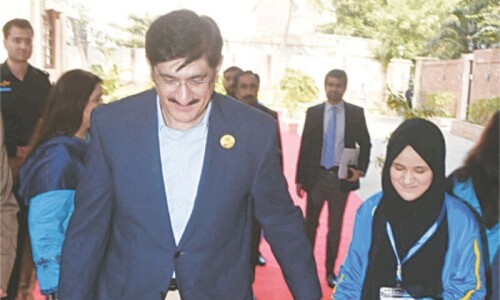
HYDERABAD: The rare diversity in Shaikh Ayaz’s poetry is his hallmark and all references of Sindh regarding resistance, struggle and modernism would be incomplete without Ayaz.
This was stated by poets and writers at the sixth Ayaz Melo that coincided with his (Ayaz) death anniversary, here on Monday at Sindh Museum.
The two-day festival that got under way on Monday under the aegis of Khanabadosh writers cafe is sponsored by the Sindh culture department.
Dr Arfana Mallah and Amar Sindhu explained at the outset that virtual sessions were being organised in view of Covid pandemic and proceedings had been restricted to two days against the past practice of eight days.
Sixth Ayaz Melo kicks off
In his keynote speech, Sindh Minister for Culture Syed Sardar Ali Shah, himself a poet, termed Ayaz a miracle for Sindh like Moenjodaro and Shah Abdul Latif Bhitai.
Agreeing with analyst Jami Chandio, he said Ayaz indeed was lucky to have created an era through poetry. He termed Ayaz a phenomenon.
He regretted that Sindh lacked genuine critics. “In fact, we lack culture of having genuine critical views.”
Suggesting that Sindhis should be more responsible in their behaviour, he welcomed criticism at the culture department if it was constructive and not negative.
He believed that plenty of work still needed to be done and said Ayaz had felt pain for the division of the subcontinent because he witnessed how indigenous population left Shikarpur and Hyderabad during the partition.
Ayaz witnessed One Unit’s imposition and the way Karachi was “snatched”.
Sindh Assembly’s speeches were being compiled right from 1937, he said and added Sindh was separated from Bombay Presidency in 1936 and the assembly was created in 1937. The compilation would reveal how many milestones had been achieved by Sindh so far, he added.
He said that Ayaz’s poetry was imbued with love for motherland and its vast cultural geography.
He announced celebrating Ayaz’s birthday on March 2 and said that Ayaz’s works would be archived with new compositions.
Speaking through video link, poet Iftikhar Arif said those who had written on Shaikh Ayaz had in fact eulogised him and likewise poets like Himayat Ali Shair, Asif Farrukhi, Fahmida Riaz and others had played a role in introducing Ayaz in order languages.
He said Ayaz also faced many controversies as well which could not be debated on the occasion.
He said an author could not become universal unless he was indigenous. Arif remarked “there is rich diversity in his poetry which is not seen in others”.
Arif said Ayaz was a great poet of modern world after Bhitai.
Speaking from India, scholar Vimmi Sadarangani said Sindh and river Indus had been manifested in Ayaz’s poetry. She described him as poetry of “Sindh and Hind” and said that his poetry reflected peace.
She said that it were authors who had to bear the brunt of border-related restrictions. She said today the world needed peace.
Jami Chandio said Ayaz should not be confined to Sindh alone. Ayaz’s poetry encompassed Sindh’s cultural and geographical boundaries as he was an exceptional poet. Ayaz was symbol of modern Sindh and he introduced new values and trends in Sindh’s classical poetry, he added.
He said Ayaz belonged to a classical era and his poetry covered Persian ideology. He said his works reflected Western trends of writing and poetry.
He said Urdu-speaking literati owed it to Ayaz — who was an original Urdu poet — that he should be counted among them. He said Sindh’s history of resistance and struggle would be incomplete without Shaikh Ayaz.
Munir Ahmed Badini said Ayaz’s poetry was marked by spontaneity. Ayaz could not be confined to any system, he said and added that he remained undeterred despite trials and tribulations. Ayaz’s love with his land was foundation of his poetry.
As long as creativity was not linked with motherland its roots remained hollow. If Sindhi language did not develop, Bhitai and Ayaz would fall into obscurity, but today Sindhi language was a developed phenomenon.
Others who also spoke included Madad Ali Sindhi, Taj Joyo and Amar Sindhu.
Published in Dawn, December 29th, 2020














































Dear visitor, the comments section is undergoing an overhaul and will return soon.